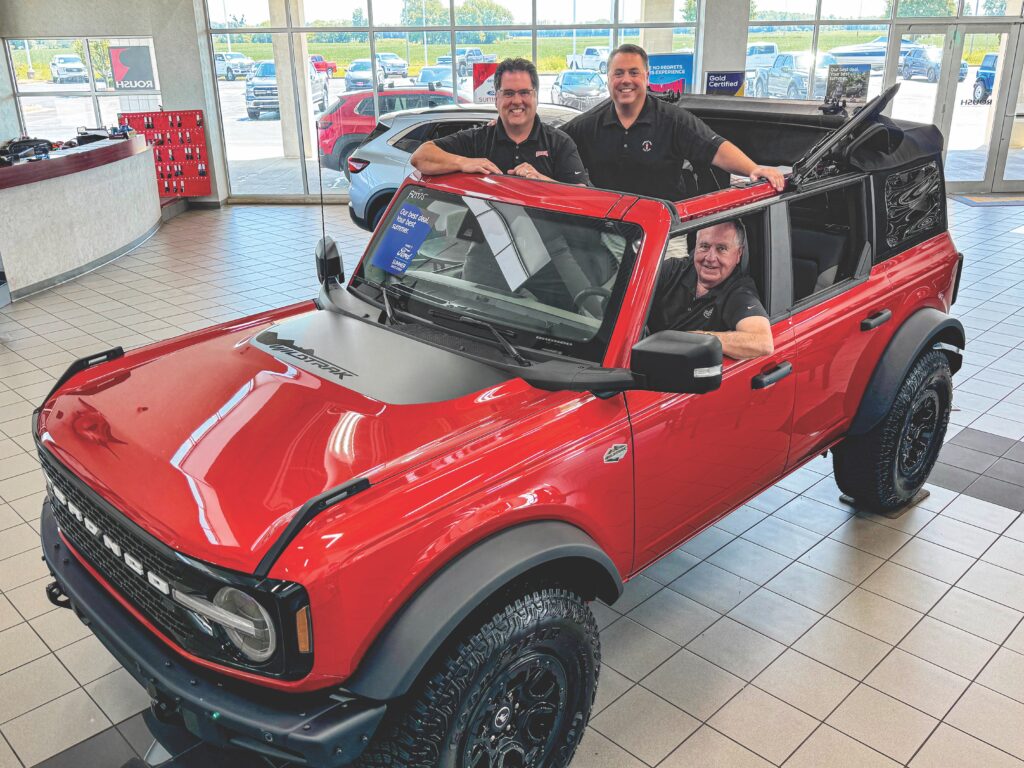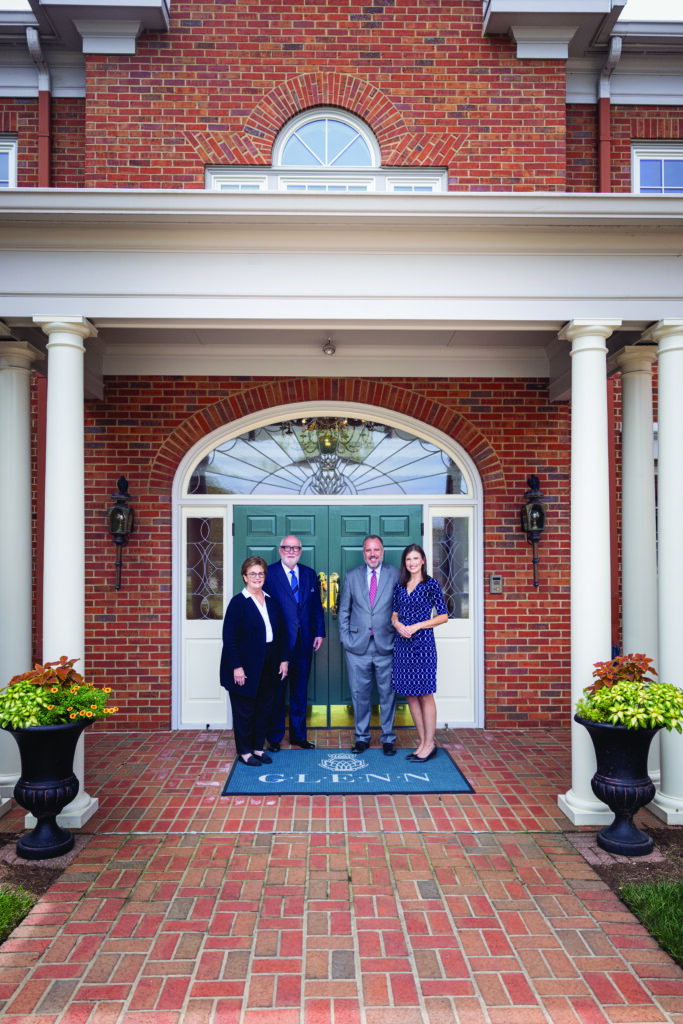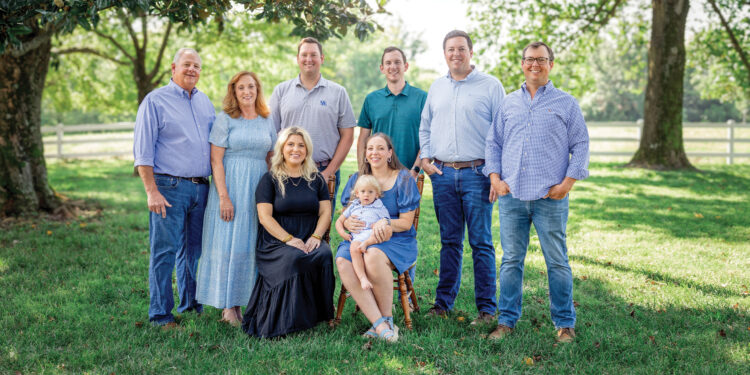Carrying on Tradition and Serving the Community
Photos by Jamie plain
What do farms, funerals, and Fords have in common? No, this is not a terrible joke or a trick question. In this case, what unites a trio of businesses is that in each category, Owensboro has a multi-generational family of professionals serving the community.
Gilles Farms
The Gilles family has been working the land of Daviess County since 1898. Currently, the 4th and 5th generations practice row crop farming and produce corn, soybeans, wrapper tobacco, and hay. Additionally they maintain a herd of Seedstock Angus Beef Cattle and sell direct to consumer beef.
Jim Gilles, who also independently owns the satellite business of Hillview Farms, represents the 5th generation of the Gilles farming operation. He can easily describe the changes that have occurred from one generation to the next. Overall, he says, farming has moved, “From horse drawn implements and hand harvesting to now having equipment that drives itself and much more advanced research backed practices.” He elaborates that for the Gilles family, recent big changes can be pinpointed. Between the 3rd and 4th generation (represented by his father, Jimmy) use of new seed technology made for a much cleaner crop with added yields and ease of harvest. His own generation, Jim says, “has helped usher in a lot more technology in terms of GPS and equipment that helps improve the efficiency of the farm and the producer as well as save on input costs associated with planting and harvesting row crops.”
Gilles’ technical knowledge and (noticeable to the moonlighting teacher writing this article) ability to communicate agronomical concepts to a near novice (near, because I am from Hopkinsville, after all) are evidence of the depth of work ethic and pride he has in his career and his family.
He says the best aspects of working with family are that you get to see and work with your family every day. Tongue in cheek, he adds that is also the worst part. “You get to build stronger ties with multiple generations of the family because you are working with them daily,” he says. “Everyone has a vested interest in the business and its success.” Though struggles and joys are shared, agriculture can be especially taxing because the hours can be long and often aren’t set, and work often bleeds over into personal time, he explains.
His advice to others in a family business is that patience and communication are key. “Use the multiple generation aspect of your family connections to help guide and make decisions. The older generation can learn as much as the younger generation and vice versa.”
Champion Ford Lincoln Mazda
Duke Brubaker, his brother Tyler, and their father, Bruce Brubaker Jr., are the owners and operators of Champion Ford Mazda on Southtown Boulevard. Since 1990, the two generations have done more than just “sell cars.” The dealership, which began downtown, offers new vehicle sales, used vehicle sales, Quick Lane Tire and light maintenance center, a service department, parts department, collision department, and detail department.

According to Duke, the biggest change Champion has undergone – other than a location change – is the way they are able to communicate with their customers. “During our first generation, we only had direct mail, face to face, and telephone,” he says. “Now we have additional ways to communicate, such as texting, email, Facebook, Instagram, X, and website chat.”
For Brubaker and his family, the best part of working with family is that “you can trust that everyone has the best interest of the business in mind.” However, he points out, “You’re never off the clock. A family dinner or outing will almost always include some aspect of the business.”
Additionally, taking time off together has been a struggle at times in the past 33 years.
Though he mentioned communication as a big change, Duke Brubaker relayed a story about a marketing tactic that seems wildly unrealistic today. “Back when we were at our downtown location, we hired an animal trainer to bring in live cougars to commemorate the launch of an all-new Mercury Cougar,” he says. “Customers and employees loved taking pictures with the big cats, which were secured on the hoods of the cars in our showroom. At night, we let them roam free in our parts department during the promotion. The parts department retained the ‘cougar smell’ for years until we moved out to our new location.
Brubaker says that working as a family doesn’t change the fact that different members have their own opinions and ways of doing things. “Sometimes those opinions clash and a resolution is needed,” he says. To others starting a family business, he advises, “invest in your business early with your time and lead by example. Never ask an employee to do something you wouldn’t do yourself.”
Glenn Family Services
Passing Glenn Funeral Home at 900 Old Hartford Road at Breckinridge, it is easy to underestimate the volume of services that go into the business of death. Glenn Funeral Home and Crematory is one of a family of companies – family owned and operated – collectively presented as Glenn Family Services. The impetus for Glenn Family Services began in 1903 with the great grandfather of the current proprietor and figurehead, Glenn Taylor.

“Because so very much has changed through five generations and over 120 years,” Glenn Taylor says, “It might be best to start with what has not changed, and that’s why we do what we do.” Taylor, who operates the business on a day-to-day basis with his wife, Camilla, son Glenn Peyton Taylor, Jr. and daughter in law, Rachel Skipworth Taylor, explains that “from the first generation to the fifth” they know what to do when a death occurs. He elaborates, “Grief is accompanied by worry. What needs to be done, who’s going to do it, what don’t I know about, what should I know about, who has the answers?”
Glenn prides themselves on serving “a remarkably broad cross-section of our community.” Regardless of customs, traditions, beliefs, personal feelings, or circumstances, the goal at Glenn is to listen carefully, give information openly, answer questions honestly, suggest thoughtfully, and deliver care exceptionally. Doing so enables the Taylors and their team to “provide uniquely personal farewells that reflect the views and honor the story of a lifetime.”
For Glenn Taylor, who has found himself both in the position of being, at different times, the youngest and the oldest generation working, the best aspects of working with family are trust, mutual understanding of the “Why” of the business, and confidence. He says it is good to know that there are family members, who in the absence of one, can carry on. “While there is consensus on the ‘Why’,” he says, “there can be differences between the approaches to the ‘How’.” He says there are occasional conflicts of generational knowledge.
Taylor learned firsthand that responsibility must be earned. He recalls that when he first expressed interest in working for his father, he appeared the first morning in a pressed suit, with a starched shirt, perfectly knotted tie, and gleaming shoes. “Dad asked what I had planned for the day. My response was that I was there to work. By his tone, it was clear there was a misunderstanding. He told me to go home and come back in jeans, a t-shirt, and boots. I understood. I was going to do yard work. Well, I was close. I was going to spend the day, and the summer, at Owensboro Memorial Gardens; mowing grass, trimming around markers, and digging graves.” He says at that time there were no string trimmers and the cemetery had no backhoe. Markers were hand trimmed and graves were hand dug. His point? “Not many can say they began their career at the bottom and worked their way down.”
Always introspective and eloquent, Taylor’s advice to others in family business is “It’s about these things in the following order: Caring for your team, caring for your customers – they are not just a transaction, they are people, just as you are.” He says there should be no shame if and when family members have interests other than the family business. “I have seen wonderful, multigenerational family businesses fail or be sold because a family member joined it out of a sense of obligation instead of truly wanting to. It’s unfortunate for the family, the individual, the business, and often the community.”
Addressing the misconception that family businesses are easy because they are established, Taylor says, “It’s not. It’s rewarding and encouraging and gratifying, but it’s not easy. I’ve not been as good at it as I might have been, but hope I’ve learned and am learning to be better.” OL










